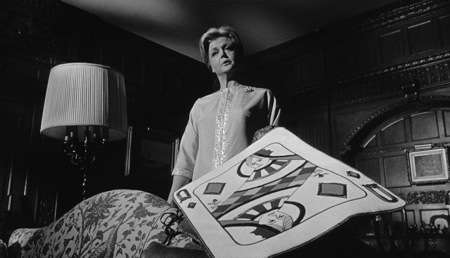The Communist Party's Role in the Rise of Joseph McCarthy
No, not some crazy Manchurian Candidate scenario

As a postscript to this morning's item about Joe McCarthy, here's a fun question for you: What role did the Communist Party play in McCarthy's rise to federal office? No, I'm not talking about some crazy Manchurian Candidate scenario—just the accidental effects of the party's activities in the 1946 election.
Before then, Wisconsin was represented in the Senate by Bob LaFollette, Jr. The senator had been affiliated with the Progressive Party, a left-wing outfit, but in the mid-'40s the Progressives merged with the GOP. (That sounds extremely weird today, I know. But it was possible to be an overtly liberal Republican back then.) After the merger, LaFollette lost to McCarthy in the Republicans' 1946 primary.
Why did McCarthy beat LaFollette? The main reason is that the Democratic candidate, Howard McMurray, campaigned hard for the state's liberals to vote for him in the Dem primary (where he was running unopposed) rather than for LaFollette in the contested Republican race. He was fairly successful in this: Not every member of the old Progressive Party was eager to follow LaFollette into the GOP, and even if they wanted to support LaFollette there were candidates for other offices that they could back only if they voted in the Democratic race.
Organized labor in particular decided, for the most part, to vote for McMurray rather than LaFollette. And among the forces pushing the unions in that direction were the Wisconsin Communists, who hated LaFollette—like many people on the non-Marxist left, he was strongly anti-Communist. (McCarthy, meanwhile, had not yet embraced the issue that would make him famous. He appeared at this point to be member of the moderate, internationalist wing of the Republicans, attacking LaFollette for "voting in opposition to world co-operation.")
Did the Communist Party play the deciding role in LaFollette's loss? LaFollette himself thought so, but he was probably wrong: Patrick Maney's bio Young Bob makes a good case that other factors were more important. But the Communists did play a role in McCarthy's win. If you're a fan of juicy historical ironies, you can add that to your file.
Editor's Note: As of February 29, 2024, commenting privileges on reason.com posts are limited to Reason Plus subscribers. Past commenters are grandfathered in for a temporary period. Subscribe here to preserve your ability to comment. Your Reason Plus subscription also gives you an ad-free version of reason.com, along with full access to the digital edition and archives of Reason magazine. We request that comments be civil and on-topic. We do not moderate or assume any responsibility for comments, which are owned by the readers who post them. Comments do not represent the views of reason.com or Reason Foundation. We reserve the right to delete any comment and ban commenters for any reason at any time. Comments may only be edited within 5 minutes of posting. Report abuses.
Please to post comments


Jessee,
McCarthy was just an opportunistic politician who tried to capitalize on the real problem of there being more than a few no kidding communists in the FRD administration. Had McCarthy never been elected, some other equally devious and opportunistic politician would have done the same thing. The only thing that might have been different is that the new McCarthy might have been a Democrat, which would have greatly complicated the resulting leftist narrative.
I hate Wisconsin communists.
Second.
The article this morning was quite an enjoyable read, as was the comments thread. Here's hoping we get some more pouting from the far-left wing of the commentariat about their poor persecuted Stalinists.
The usage of "Progressive" is truly odd today in a way. Especially for a political movement spawned by the daemon seed of Republican Teddy Roosevelt.
The Republican and Democratic parties in those days weren't as ideologically cohesive and divided as they are today. Many of the most prominent progressives were Republicans (such as Robert LaFollette)